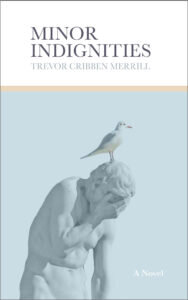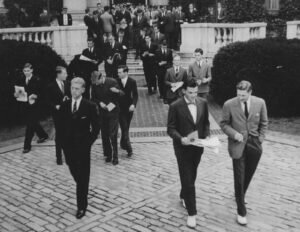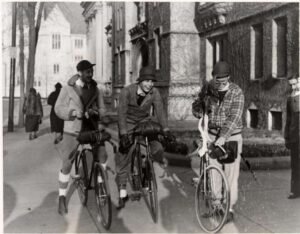Minor Indignities
When I was a student at Yale in a seminar titled "The Apogee of American Poetry," I offered an interpretation of When Lilacs Last in the Dooryard Bloom’d that caused Harold Bloom great difficulty in containing his disappointment. He didn't think my insight was very good. That's a true story. When Trevor Cribben Merrill, author of Minor Indignities, writes about a similar experience, I was shocked to learn that he made it up. His work of fiction, it turns out, is actually fiction. This might seem to be an obviously self-proving proposition. We typically expect novels to be fictional, and the narrator of the novel is Colin, not Trevor Cribben Merrill. But trust me, when you read Minor Indignities, the narrative comes across with such a convincing, first-person delivery that it seems clear that it's a heavily autobiographical work. I assumed as much, and emailed Mr. Merrill and asked. It's all fiction.It's only fitting that while I read the novel, I labored under this glaring misidentification about the veracity of the events described therein. After all, the novel is set in an unnamed Ivy League university (I recognized it immediately as Yale), and the Ivy League is entirely about identity. Each fall, these bastions of elite education open their arms to all manner of diverse, naive overachievers, and each spring they release them back into the world just a little bit more prone to think and act exactly like all of their Ivy League compatriots. We matriculate within the same womb and share the same mother. We are carefully shaped and molded, taught to see the world through an Ivy-specific lens. We learn to value the same things, to despise the same things, to transgress in all the right ways, and most of all we learn to be worthy of our alma mater. The identity of a Yalie is pulled on as effortlessly as a J.Press Shaggy Dog and drifts off the lips more smoothly than the turkish blend at The Owl. Yalies talk a certain way and look a certain way.Personally, I'm proud of it, while fully acknowledging how ridiculous and truly unimportant it is, only tangentially touching on questions of happiness, talent, and personal identity. My own search for identity, like most precocious and slightly bitter young college students, was fraught. It began in high school and then carried me through to Yale, but through that crucible I've come to make peace with who I am and, more importantly, who I am not. More than anything, this coming-to-terms is tremendously freeing, allowing me to consider my time in the Ivy League and the affectations I learned to carry there with self-knowledge and whimsy. To this day as a Catholic priest who wears a cassock without fail, I refuse to wear socks with my black suede penny-loafers. A Yalie always shows a bit of ankle. My mid-western parishioners give me no end of grief for this pretension, but I only smile and absorb the mockery. It's a pretension, to be sure. But I'll never change.For others, however, questions of personal identity can exact a more brutal cost. Some lost souls remain lost. Others can only truly discover themselves through personal tragedy or humiliation. The process is particularly difficult – I know, cry me a river - for those who arrive to the gothic-towered campus of an upper-class university that projects an aura of security and self-assurance. All their young lives, these students have been the popular ones, the smart ones, the ones who were destined for great things. At a place like Yale, they're just kids.Worst of all, they're self-aware, ambitious savants who have already read and begun to play-act Derrida and Lacan. They're obsessed with deconstructing identities, destroying suburbia, and questioning everything about religion, western culture, and America. Particularly targeted by their ire are the religion of their childhood, the culture of their parents, and the specific incarnation of America from which they hail. In this intellectually drunken haze, gleefully stoked by teacher's assistants, various personalities are thrown on like costumes until they dissolve to paste.The veneer remains. Cups will always be shared at Morys. The Yale diploma will always be special. The Old Campus will always draw tourists. The secret societies will continue to connect the powerful. No joke, I'm wearing a Yale hoodie right now as I type this. I wear Yale cufflinks almost every day. I would go back tomorrow if I could.
When Trevor Cribben Merrill, author of Minor Indignities, writes about a similar experience, I was shocked to learn that he made it up. His work of fiction, it turns out, is actually fiction. This might seem to be an obviously self-proving proposition. We typically expect novels to be fictional, and the narrator of the novel is Colin, not Trevor Cribben Merrill. But trust me, when you read Minor Indignities, the narrative comes across with such a convincing, first-person delivery that it seems clear that it's a heavily autobiographical work. I assumed as much, and emailed Mr. Merrill and asked. It's all fiction.It's only fitting that while I read the novel, I labored under this glaring misidentification about the veracity of the events described therein. After all, the novel is set in an unnamed Ivy League university (I recognized it immediately as Yale), and the Ivy League is entirely about identity. Each fall, these bastions of elite education open their arms to all manner of diverse, naive overachievers, and each spring they release them back into the world just a little bit more prone to think and act exactly like all of their Ivy League compatriots. We matriculate within the same womb and share the same mother. We are carefully shaped and molded, taught to see the world through an Ivy-specific lens. We learn to value the same things, to despise the same things, to transgress in all the right ways, and most of all we learn to be worthy of our alma mater. The identity of a Yalie is pulled on as effortlessly as a J.Press Shaggy Dog and drifts off the lips more smoothly than the turkish blend at The Owl. Yalies talk a certain way and look a certain way.Personally, I'm proud of it, while fully acknowledging how ridiculous and truly unimportant it is, only tangentially touching on questions of happiness, talent, and personal identity. My own search for identity, like most precocious and slightly bitter young college students, was fraught. It began in high school and then carried me through to Yale, but through that crucible I've come to make peace with who I am and, more importantly, who I am not. More than anything, this coming-to-terms is tremendously freeing, allowing me to consider my time in the Ivy League and the affectations I learned to carry there with self-knowledge and whimsy. To this day as a Catholic priest who wears a cassock without fail, I refuse to wear socks with my black suede penny-loafers. A Yalie always shows a bit of ankle. My mid-western parishioners give me no end of grief for this pretension, but I only smile and absorb the mockery. It's a pretension, to be sure. But I'll never change.For others, however, questions of personal identity can exact a more brutal cost. Some lost souls remain lost. Others can only truly discover themselves through personal tragedy or humiliation. The process is particularly difficult – I know, cry me a river - for those who arrive to the gothic-towered campus of an upper-class university that projects an aura of security and self-assurance. All their young lives, these students have been the popular ones, the smart ones, the ones who were destined for great things. At a place like Yale, they're just kids.Worst of all, they're self-aware, ambitious savants who have already read and begun to play-act Derrida and Lacan. They're obsessed with deconstructing identities, destroying suburbia, and questioning everything about religion, western culture, and America. Particularly targeted by their ire are the religion of their childhood, the culture of their parents, and the specific incarnation of America from which they hail. In this intellectually drunken haze, gleefully stoked by teacher's assistants, various personalities are thrown on like costumes until they dissolve to paste.The veneer remains. Cups will always be shared at Morys. The Yale diploma will always be special. The Old Campus will always draw tourists. The secret societies will continue to connect the powerful. No joke, I'm wearing a Yale hoodie right now as I type this. I wear Yale cufflinks almost every day. I would go back tomorrow if I could. The Ivy Style is eternal, but underneath it, the students are just children. Even the graduate students and many of the professors seem to be mired in arrested development. They're trying to grow into adulthood and they fail or succeed at the exact same rate as anyone else. In fact, the process may be more difficult in such a rarified atmosphere. The living and breathing human beings, with all their fears and vulnerabilities and quirks and gifts, are slowly buried under layers of irony and academic theory. The hallmark of the process is the skepticism of endless debate – about movies, novels, philosophy, religion, morality, and/or whether any of the above actually exist. It's a show that the students use to hide their insecurity. The easiest and surest way to survive is to hide, to be the most skeptical, the most ironic, to drop the most names. Even as they lash out and argue and rebel, these elite students fail to notice they're all using this shared language. They're being molded into the Ivy identity.It's a trap. It happens to all of us, regardless of where and how we have come of age, now matter how we formed our mature identity. We become so consumed in not being exposed for the frauds that we are that we lose that identity entirely. A student starts to dress and act and talk like all the other students. A writer begins to imitate other writers. An artist follows the fashionable trends in order to gain gallery space.
The Ivy Style is eternal, but underneath it, the students are just children. Even the graduate students and many of the professors seem to be mired in arrested development. They're trying to grow into adulthood and they fail or succeed at the exact same rate as anyone else. In fact, the process may be more difficult in such a rarified atmosphere. The living and breathing human beings, with all their fears and vulnerabilities and quirks and gifts, are slowly buried under layers of irony and academic theory. The hallmark of the process is the skepticism of endless debate – about movies, novels, philosophy, religion, morality, and/or whether any of the above actually exist. It's a show that the students use to hide their insecurity. The easiest and surest way to survive is to hide, to be the most skeptical, the most ironic, to drop the most names. Even as they lash out and argue and rebel, these elite students fail to notice they're all using this shared language. They're being molded into the Ivy identity.It's a trap. It happens to all of us, regardless of where and how we have come of age, now matter how we formed our mature identity. We become so consumed in not being exposed for the frauds that we are that we lose that identity entirely. A student starts to dress and act and talk like all the other students. A writer begins to imitate other writers. An artist follows the fashionable trends in order to gain gallery space. When Colin, the narrator of Minor Indignities, begins his unrelenting confession of humiliation, he is on his way to Yale for the first time. He looks at his reflection in the mirror and already begins to dream of his new identity once steps foot on the campus, how his future is a blank slate. Emotionally, he's already preparing to dissimulate about his past. He's ready to move on from his longtime girlfriend, reluctant to betray his smalltown roots, and even hesitates to tie himself down to a fellow student named Julia he'd met over the summer. Throughout his first year, he's like a man watching another man speak and act. He's outside of himself, frantically evaluating how he appears to others. He carefully plots his days as a budding writer and a romantic raconteur. The only thing he forgets is to actually live his life.In fact, his search for personal identity goes so incredibly wrong that he loses all perspective. His fear paralyzes him and, ironically, pushes him towards excessive irrationality and impulsiveness. It's a strange paradox that the more tightly we grasp our artificially constructed version of our identity, the more false that identity becomes. Eventually, like all egotistical turns inward, it becomes irrational and leads to humiliation.For Colin, after his final humiliation - which I won't spoil here - he can no longer pretend. He must be himself or he will become nobody, so he finally confesses his actions to a fellow student, explaining, "for some reason the idea of manufacturing another lie, of masquerading interminably to protect my image, was unthinkable just then. Maybe I was just too tired, too fed up, too bruised for posing."The question of identity also comes up in the fictional - I have to remind myself it's fictional - conversation between Colin and his creative writing teacher, who tells him, "The artist's life, like the soldier's, is one of hardship and self-denial. It has to be...we have to be mobile, obedient, quick to say 'yes'. We have to be ready to jump out of an airplane with only a parachute and a knife, hit the ground running, dig a trench with our bare hands, cross the Alps on foot – on our knees if necessary!" In other words, an artist must be prepared to be humbled before the art, fall prostrate by the work, and willing to let go of self-consciousness long enough to intuit the contours of reality.Maybe someday we'll all tire of our posing long enough to make authentic human connections, to allow ourselves to stumble in front of another person without embarrassment, to show our secret writing to an editor, to kneel in prayer and become lost to ourselves in the embrace of God's all-embracing love, a love so powerful it takes everything we thought we were away from us and sets us free to be truly ourselves.
When Colin, the narrator of Minor Indignities, begins his unrelenting confession of humiliation, he is on his way to Yale for the first time. He looks at his reflection in the mirror and already begins to dream of his new identity once steps foot on the campus, how his future is a blank slate. Emotionally, he's already preparing to dissimulate about his past. He's ready to move on from his longtime girlfriend, reluctant to betray his smalltown roots, and even hesitates to tie himself down to a fellow student named Julia he'd met over the summer. Throughout his first year, he's like a man watching another man speak and act. He's outside of himself, frantically evaluating how he appears to others. He carefully plots his days as a budding writer and a romantic raconteur. The only thing he forgets is to actually live his life.In fact, his search for personal identity goes so incredibly wrong that he loses all perspective. His fear paralyzes him and, ironically, pushes him towards excessive irrationality and impulsiveness. It's a strange paradox that the more tightly we grasp our artificially constructed version of our identity, the more false that identity becomes. Eventually, like all egotistical turns inward, it becomes irrational and leads to humiliation.For Colin, after his final humiliation - which I won't spoil here - he can no longer pretend. He must be himself or he will become nobody, so he finally confesses his actions to a fellow student, explaining, "for some reason the idea of manufacturing another lie, of masquerading interminably to protect my image, was unthinkable just then. Maybe I was just too tired, too fed up, too bruised for posing."The question of identity also comes up in the fictional - I have to remind myself it's fictional - conversation between Colin and his creative writing teacher, who tells him, "The artist's life, like the soldier's, is one of hardship and self-denial. It has to be...we have to be mobile, obedient, quick to say 'yes'. We have to be ready to jump out of an airplane with only a parachute and a knife, hit the ground running, dig a trench with our bare hands, cross the Alps on foot – on our knees if necessary!" In other words, an artist must be prepared to be humbled before the art, fall prostrate by the work, and willing to let go of self-consciousness long enough to intuit the contours of reality.Maybe someday we'll all tire of our posing long enough to make authentic human connections, to allow ourselves to stumble in front of another person without embarrassment, to show our secret writing to an editor, to kneel in prayer and become lost to ourselves in the embrace of God's all-embracing love, a love so powerful it takes everything we thought we were away from us and sets us free to be truly ourselves.
